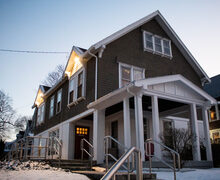Undergraduate research students share immersive summer experience
Wendy Wang | Asst. Photo Editor
Despite good research experiences, some undergraduate student researchers still face financial challenges.
Get the latest Syracuse news delivered right to your inbox.
Subscribe to our newsletter here.
After the spring 2021 semester concluded, Amaar Asif, a senior studying biology and neuroscience, chose to join the summer research team at the Center for Reproductive Evolution at Syracuse University.
The center — which consists of several professors, post-doctoral fellows, doctoral and graduate students — hired several undergraduate research assistants over the summer. Asif said the opportunity helped him greatly in furthering his research skills and career development.
The project Asif assisted focuses on evolutionary sexual selection and organisms. The project tries to find which genetic material is driving evolution, Asif said. This was done by uncovering the genetic bases between sperm length and female sperm storage organs of Drosophila, more commonly known as fruit flies.
“(The environment at CRE) is more collaborative over being competitive since we are all working on such distinct projects,” Asif said. “There is overlap, but it’s not like me versus someone else and who can complete it in time.”
Over the summer, about 200 undergraduate students conducted or assisted research through the Syracuse Office of Undergraduate Research and Creative Engagement, said Kate Hanson, director of the office.
Started in spring 2019, the SOURCE serves as a central hub for undergraduate-level research across disciplines, Hanson said. The office works with undergraduate students at any phase of research and provides funding to shape research projects.
In addition to student-oriented research projects, the office this year also started to provide financial grants to undergraduate students who assist faculty members’ research projects, Hanson said. Faculty members can apply to hire undergraduate students as research assistants through the SOURCE’s funding, which became a popular option over the summer, Hanson said.

Maya Goosmann | Digital Design Director
“It’s really exciting for students to get involved,” Hanson said. “I think because it kind of marks the transition in a student’s journey from being the passive recipient of knowledge to helping create new knowledge.”
MP Geiss, a junior policy studies major at SU’s Maxwell School of Citizenship and Public Affairs, has been assisting two separate research projects at SU over the summer. One of the projects is focused on developing drugs for arthritis, and Geiss worked to optimize hydrogel properties for encapsulating an anti-inflammatory molecule.
Geiss worked for another research project in SU’s College of Engineering and Computer Science focusing on monitoring the level of organic micropollutants in groundwater samples from Long Island, New York.
“Summer is a great time to try research if you can stay in Syracuse or, if you want to, do hands-on lab science,” Geiss said. “Because there’s time to learn whatever you want to learn.”
Morgan Salomon, a senior studying communications and rhetorical studies and sociology at SU, worked as a research assistant in the College of Visual and Performing Arts over the summer. Their project aimed to analyze media usage among Generation Z students at SU.
Isabel Sutherland, a fifth-year student in SU’s School of Architecture, assisted a research project pertaining to gender and housing over the past summer.
Unlike Geiss and Asif, both Salomon and Sutherland worked on their projects remotely from home. Because Salomon was working remotely, she could also work part time as a swim instructor back home in Westchester, New York.
While Salomon’s four other research teammates were scattered from the West Coast to the East, she said the team worked smoothly online throughout the summer.
“All of our communication was either over Zoom or email, which made it difficult especially with time differences and finding meeting times,” Salomon said. “But we all were really open to collaborating, so it ended up being really nice and working out well for us.”
Despite good research experiences, some undergraduate student researchers still face challenges.
The SOURCE offers undergraduate student research assistants a stipend of up to $2,800. Students receive half of the stipend in mid-June and the other half in mid-July.
While working in an on-campus laboratory over the summer, Asif has also been working as a patient care technician on the medical-surgical units at St. Joseph’s Hospital Health Center. Time management has been a crucial challenge for him to maintain the balance between his different roles.
The amount of stipend provided by the SOURCE is not enough for students who work on campus over the summer and need to find their own housing, Asif said.
“It’s a very big assumption that everyone has affordable off-campus living,” Asif said. “I’m lucky to have off-campus living, which is affordable. I also got funding from the bio department on top of the SOURCE. So, I feel like if I just had the SOURCE funding and nothing else, I would be struggling financially over the summer.”
The SOURCE wants the funding to reach as many students as possible, Hanson said. The office also tries to connect undergraduate researchers with additional funds both on and off campus. The office plans to raise the summer grants to $3,000 this upcoming summer.
The office also wants more first and second-year students to get involved in undergraduate research this academic year, Hanson said.
“If a student gets involved at an earlier stage, they will have more time to make significant contributions,” she said. “Maybe publish something or present at a conference, be part of a major exhibition, something like that.”

Published on September 6, 2021 at 1:26 am
Contact Francis: btang05@syr.edu | @francis_towne





